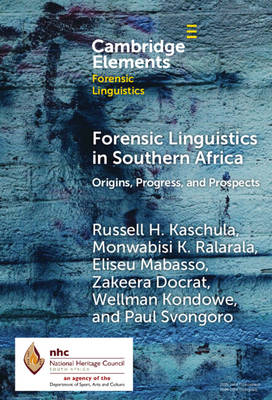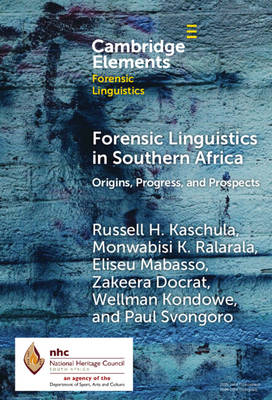
- Afhalen na 1 uur in een winkel met voorraad
- Gratis thuislevering in België vanaf € 30
- Ruim aanbod met 7 miljoen producten
- Afhalen na 1 uur in een winkel met voorraad
- Gratis thuislevering in België vanaf € 30
- Ruim aanbod met 7 miljoen producten
Zoeken
Forensic Linguistics in Southern Africa
Origins, Progress, and Prospects
Russell H Kaschula, Monwabisi K Ralarala, Eliseu Mabasso
€ 112,95
+ 225 punten
Uitvoering
Omschrijving
This Element introduces the study of forensic linguistics, particularly in southern Africa, but also in Africa more generally. In the past six decades, there has been clear evidence that the discipline of forensic linguistics is, or was, unknown to general linguists, legal linguists, and applied linguists on the African continent. Now, however, the situation is rapidly changing, with forensic linguistics studies gaining momentum in various parts of Africa. In this Element the authors introduce the topic, define the discipline, address the language of record issue in southern Africa, as well as critically debate the state of court interpreting and translation of documentation into African languages, address police interviewing techniques, while also looking at possible future developments in the discipline of forensic linguistics. This title is also available as Open Access on Cambridge Core.
Specificaties
Betrokkenen
- Auteur(s):
- Uitgeverij:
Inhoud
- Aantal bladzijden:
- 84
- Taal:
- Engels
- Reeks:
Eigenschappen
- Productcode (EAN):
- 9781009705202
- Verschijningsdatum:
- 18/12/2025
- Uitvoering:
- Hardcover
- Formaat:
- Genaaid
- Afmetingen:
- 152 mm x 229 mm
- Gewicht:
- 285 g

Alleen bij Standaard Boekhandel
+ 225 punten op je klantenkaart van Standaard Boekhandel
Beoordelingen
We publiceren alleen reviews die voldoen aan de voorwaarden voor reviews. Bekijk onze voorwaarden voor reviews.








